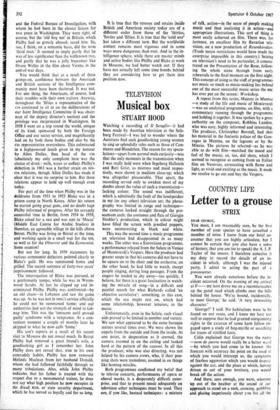Musical box
TELEVISION STUART HOOD
Watching a recording of Il Seraglio—it had been made by Austrian television at the Salz- burg Festival—I was led to wonder where the Austrians find such goodlooking young women to sing so splendidly roles such as those of Con- stanze and Blondchen. The reason for my specu- lations—apart from normal male curiosity—was that the only moments in the transmission when I was really held were when Ingeborg Hallstein and Reri Grist, as mistress and maid respec- tively, were shown in medium close-up; which was altogether pleasurable. That apart, the recording served only to awaken most of my doubts about the value of such a transmission— lacking colour. The sound was indifferent, which is admittedly the fault of the loudspeaker in my (or any other) television set; the photo- graphy was limited in range and technique— the cameras looked straight through the pro- scenium arch; the costumes and flats of Giorgio Strehler's production, which in colour might have filled the screen with jewelled puppets, were uninteresting in black and white.
This was the second time a music programme on television had disappointed in as many weeks. The other was a Eurovision programme, a performance relayed from the Salute in Venice of Monteverdi's Vespers. Here the producer had greater scope in that his cameras did not have to be square on to the choir and the orchestra; on the other hand, he had little to watch, except people singing, during long passages. From the singers he tended to shy away—too quickly, I believe, for there is a great fascination in watch- ing the miracle of song—in a difficult and painful search for what Richards called 'an -: objective -correlative': something, in this case, which the eye might rest on, which had some relationship, however tenuous, to the music.
Unfortunately, even in the Salute, such visual aids proved to be limited in number and variety. We saw what appeared to be the same baroque statues several times over. We were shown the cupola from the outside and from the inside. At one point, in desperation as it seemed, the camera zoonled in on the ceiling and looked hard at the pattern of the cassoni. In all this the producer, who was also directing, was not helped by his camera crews, who, if their pan- ning shots were tremulous, zoomed in on things- like homing missiles.
Both programmes confirmed my belief that to televise concerts, performances of opera or choral works, is a desperately difficult enter- prise, and that to present music adequately on television other techniques must be used. They are, if yen like, bastard techniques: a mixture
of talk, action—in the sense of people making music and then analysing it in action—and appropriate illustrations. This sort of thing is most easily achieved on film. There was, for instance, an excellent film by Bavarian tele- vision, on a new production of Rosenkavalier. (Trade union restrictions would have made the enterprise impossible in this country.) Seizing on television's need to be particular, it concen- trated on the Presentation of the Rose, follow- ing the whole scene through from early rehearsals to the final moment on the first night. This concept of using as the stuff of programmes not music so much as music-making lies behind one of the most successful music. series the Bac has ever put on the screen : Workshop.
A repeat from this series, Majesty in Mantua —a study of the life and music of Monteverdi —was an analytical programme, on film, with a commentary running through the programme and holding it together. It was spoken by a great authority on the composer, Robbins Landon, who was easy, highly informed and interesting. The producer, Christopher Burstall, had shot his material in the fantastic palace of the Gon- zagas in Mantua, on the lagoons or by the Mincio. The pictures he selected—as he was able to do with film—matched the mood and feel of the music; so, too, did shots, which I seemed to recognise as coming from an Italian film on Vesuvius, coruscating with flame and light, as vivid and exciting as the music. It made me resolve to go out and buy the Vespers.


































 Previous page
Previous page